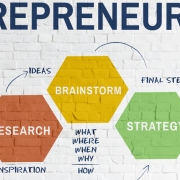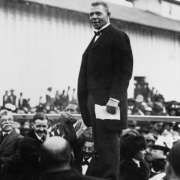During this Wuhan inspired individual rights and supply-side economic disaster, no governor in America has garnered more Mediocrity Worship from progressives and conservatives than Ohio’s Mike DeWine. The Chicago Tribune reported on April 28th, “DeWine’s decisiveness, closing schools before any governor in the country, and postponing the state’s March 17 primary to protect voters, sent his popularity soaring. Seven weeks into the crisis, DeWine is being guided by health experts while avoiding partisan fissures over stay at home orders.”
At the governor’s disposal are media hysteria, public fecklessness, and force. In contrast, individualists depend on reason, trade, and heroic souls like Poetic Justice Warrior Isabel Paterson. In her 1943 book The God of the Machine, Paterson describes the statist’s philosophical contradiction, and its false premise,
Why did the humanitarian philosophy of 18th century Europe usher in the Reign of Terror? It did not happen by chance; it followed from the original premise, objective and means proposed. The objective is to do good to others as a primary justification of existence; the means is the power of the collective; and the premise is that “good” is collective.
Because the Tribune’s standard of value is DeWine’s decisiveness for statist solutions, not moral principles, we get compulsory schools, election tampering, authoritarian healthcare policy, liberty as partisan fissure, and productivity as crime. Regarding schools, Paterson teaches,
Free education is the most absolute contradiction of facts by terminology of which the language is capable. A tax-supported, compulsory educational system is the complete model of the totalitarian state.
The statists in Chicago and Columbus understand government education and elections – it guarantees their popularity and power. Paterson understands the statist’s impotence,
That is what education under the political power must do, once it has obtained full control. It routes human energy into the dead-end political channels.
So if Governor DeWine is closing schools, postponing elections, and forcing bankruptcies, why his he so popular? Why do people sanction their own victimhood? One reason is dependent government employees, as defined by Paterson,
If a man were paid to pick up pebbles on the beach and throw them into the ocean, it would be the same as if he were in a “government job,” or on the dole; the producers have to supply his subsistence, thus preventing the normal increase of jobs.
Another reason is fear of Wuhan virus infection, regardless of the actual risk to the individual. This is rooted in today’s groupthink, “we’re all in this together.” Here, Paterson anticipates DeWine’s morality of good intentions,
Most of the harm in the world is done by good people, and not by accident, lapse, or omission. It is the result of their deliberate actions, long persevered in, which they hold to be motivated by high ideals toward virtuous ends.
But we’re not all in this together. America is predicated on the ideal of “life, liberty, and the pursuit of happiness.” What unites Americans is ownership of our lives, individually, and our mutual defense of rational self-interest. Paterson explains,
Fear and want are subjective. Poverty is the absence of wealth. If no man should ever stand naked, who is to produce clothes? Who is to have absolute power over every person? The only condition in which no one can experience poverty, want, or fear, is rigor mortis.
Yet absolute power is what Americans have concentrated in our political executive. Naturally, “It did not happen by chance. It followed from the original premise, objective and means proposed.” First, demean the moral principle of rights, as soon-to-be President Woodrow Wilson did in his 1911 Jefferson Club speech,
If you want to understand the real Declaration of Independence, do not repeat the Preface. Call on mankind to witness that we are not doing this in the spirit of insurgents, but in the spirit of free men. Men who have the true interests of humanity at heart.
The premise of progressivism maintains we owe a duty to humanity through government. An elite class of experts can be trusted to derive rights from government, and subjectively invent justice. Wilson states the objective is “to dissolve the partnership between the machine and the corporations, that is the problem of modern democracy.”
Wilson’s depravity really means dissolving men from their minds, and reinstituting the problem of modern democracy – mob rule America’s Founders had crushed 130 years earlier. To our political/education overlords, life is too complex for the “consent of the governed,” the masses must be socialized. Wilson’s means is called submission, “we, above all other men, are under bonds to prove ourselves worthy of freedom.”
Born worthy, Paterson explains Wilson’s horrific 20th century political way,
Politics is the power to prohibit, obstruct, and expropriate. It tends to encroach on the primary field of freedom. The producer may be compelled to obtain permission before he can get to work. Where expropriation is possible, consideration may be extorted.
As the second decade of the 21st century comes to a close, cleveland.com reported on May 7th that Governor DeWine was threatening a veto,
We are in the middle of an emergency now. I don’t understand why anyone would think this is a great time to be changing the law, to be taking away the power of the executive branch to protect people.
Our executive overlords are revealing their impotence. The Ohio House of Representatives had just passed a bill requiring a legislative panel to approve health department orders, if they extended beyond 14 days. In quaint modern times, this was called due process. In DeWine’s postmodern confusion,
We’re trying to bring the economy back. We have a budget we’re trying to balance. So many, many things we have to do. I guess I just don’t quite understand it.
The bill also grants legal standing to any Ohio citizen to sue over health orders, of which DeWine complained would be “chaos.” Too late, on April 16th, the 1851 Center for Constitutional Law had already filed suit over the Ohio ban on “non-essential business.” Progressives foment chaos in order to mitigate chaos. The alternative is Western Civilization’s moral precepts. According to a review of Paterson’s book by the Cato Institute,
Paterson sees in Rome the origin of law in its modern sense: an abstract set of principles, with their own internal logic, independent of the will of any particular ruler.
Paterson’s book also describes pre-American feudal “status societies” (and “non-essential work”), and Cato continues,
Like planned economies, these locked workers in particular roles, preventing adjustment to circumstances or new ideas. Paterson considers antitrust law, and concludes that, far from preserving competition, it tends to resurrect the society of status.
Personal liberty is a fundamental right, not a political fissure. Without just cause and due process, stay at home orders are the crime, not productive ability. Paterson further teaches about moral justice,
If profit is denounced, it must be assumed that running at a loss is admirable, and requires justification. Profit is self-justifying.
The mother of all Poetic Justice is profit, and one of three godmothers of the modern American libertarian movement is Isabel Paterson. As founding editor of The Freeman John Chamberlain wrote over fifty years ago,
If it had been left to (timid) males, nothing much would have happened. It was three women, Paterson, Rose Wilder Lane, and Ayn Rand – who, with scornful side glances at the male business community, decided to rekindle a faith in an American philosophy.













